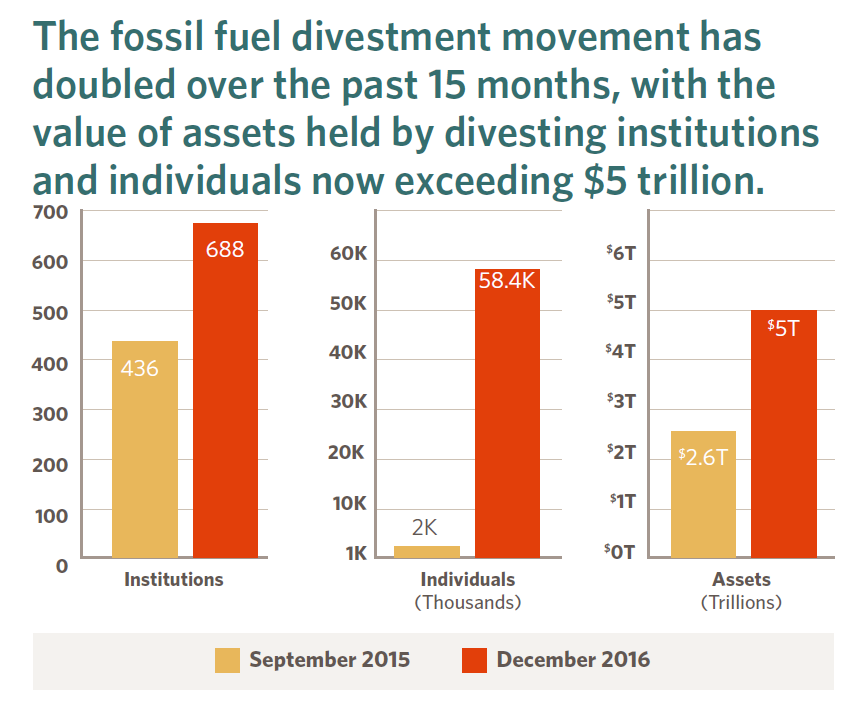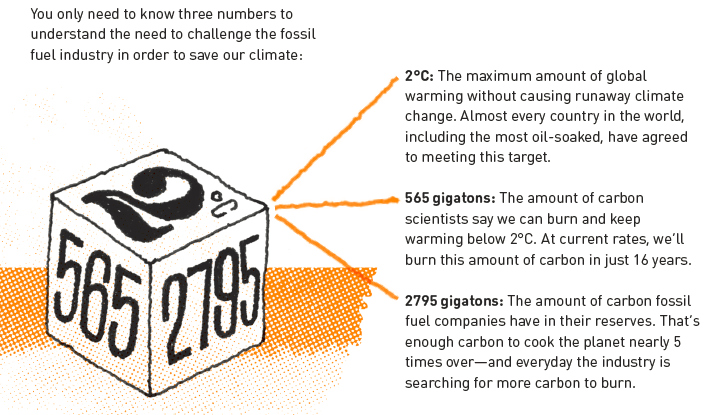Divest Waterloo is committed to supporting fossil fuel divestment campaigns within faith communities and public institutions, such as the University of Waterloo (UWaterloo) and Wilfrid Laurier University (Laurier).
Divest Laurier
In response to a faculty letter urging the University to move its investments out of fossil fuel related holdings, Laurier’s Board of Governors established a working group to develop a policy on responsible investing. Laurier’s Responsible Investment Working Group is now gathering input from the university community on the non-financial factors – environmental, social or governance factors – that should be considered in addition to financial factors when assessing options for a long-term investment strategy.
Submissions will be accepted until the end of the day on March 3, 2017 by email (crafalski at wlu.ca) or mail (c/o University Secretariat, R242, 202 Regina Street, Waterloo).
Submissions can also be made in person, at
- Waterloo Campus – Tuesday, March 7, 3:30-5:00pm, Board and Senate Chamber
- Brantford Campus – Wednesday, March 8, 10:00-11:30am, Student Centre Multipurpose Room.
Submissions should consider the following:
- What does “Responsible Investing” mean to you?
- Is Responsible Investing important to you and/or the university? Why?
- Beyond legal requirements, what key principles or factors should guide the university’s investment policies and procedures related to Responsible Investing?
- What assessment criteria should the university use to determine if its approach to Responsible Investing has been effective?
The following resources can help you understand why fossil fuel divestment matters, and you can use them to support your submission to Laurier’s Responsible Investment Working Group.
- Fossil fuel stocks have underperformed for several years
- Studies show screening out fossil fuel stocks is safe
- Fossil free portfolios are doing as well as or slightly better than the market average
- Coal is in decline
- Natural gas’ future is unpredictable
- Renewable energy will soon be cheaper than fossil fuels
- When the carbon bubble bursts, fossil fuel stocks will plunge
See the fully referenced infographic here

Source: Arabella Advisors, Global Divestment Report, 2016
As of the December 2016, 688 institutions and 58,399 individuals across 76 countries have committed to divest from fossil fuel companies
– Arabella Advisors, Global Divestment Report, 2016. Read it here.
Want to see which other institutions have already committed to divest from fossil fuels? Look here.
Making The Case for Divestment
Inspiration
Read what others have said about the case for universities to divest from fossil fuels.
- Wilfrid Laurier University’s Financial Future: Responsible Investing In The Anthropocene – Simon Dalby, School of International Policy and Governance, WLU. Submission to the Responsible Investment Working Group.
- The Ethics of Responsible Investing in the Age of Climate Change – Byron Williston, Department of Philosophy, WLU. Submission to the Responsible Investment Working Group
- The Fossil Fuel Industry and the Case for Divestment – Report by Toronto350.org to support the University of Toronto divestment campaign
Financial
There is growing public awareness about the financial risks of remaining invested in fossil fuel companies.
- Unburnable Carbon: Wasted Capital and Stranded Assets, 2013. Report by the Carbon Tracker Initiative and the Grantham Research Institute of Climate Change and the Environment
- University of Toronto loses $550 million by not divesting from fossil fuels– CNW (Canada Newswire)
- Wellcome Trust loses millions as its fossil fuel investments plunge in value – The Guardian
- Massachusetts pension fund hit by losses in fossil fuel stocks – Boston Globe
- New York lost billions with fossil fuel investments – Grist Magazine
- On Borrowed Time: Banks & Climate Change – Update Report, 2017 – Boston Common Asset Management
Individuals are also vulnerable when their mutual funds continue to hold fossil fuel investments.
Social / Moral
“We don’t need an army of actuaries to tell us that the catastrophic impacts of climate change will be felt beyond the traditional horizons of most actors – imposing a cost on future generations that the current generation has no direct incentive to fix.” – Mark Carney, Governor of the Bank of England
- The Real Impact Of Universities Divesting From Fossil Fuels – Huffington Post
- Can Canada Expand Oil and Gas Production, Build Pipelines and Keep Its Climate Change Commitments? – Canadian Centre for Policy Alternatives
- Extracted Carbon: Re-examining Canada’s contribution to climate change through fossil fuel exports – Corporate Mapping Project
- Climate Justice: An Intergenerational Approach – Mary Robinson Foundation
- Canadian are making a supersized gamble on climate and the economy – National Observer
- Trump, Putin and the Pipelines to Nowhere – The Nearly Now
Video Resources
The following short films provide a great introduction to the connection between fossil fuels, climate change, and the divestment movement. Most are under 5 minutes.
- The Burning Age (4 min: 20 sec) Kai Reimer-Watts (UW Masters of Climate Change graduate) Explains the history of fossil fuels and their connection to climate change. Good starting point to understand the science of Climate Change.
- 300 Years of FOSSIL FUELS in 300 Seconds (5:38) Post Carbon Institute (19 March 2011) Winner of YouTube’s Best Non-profit Video Award!!! Excellent resource for understanding the history of the fossil fuel industry.
- Climate Change – The Numbers (3:04) 350.org founder Bill McKibben explains the ‘math of climate change’ – the connection between CO2 emissions and 2 degrees of global warming.
- Act NOW! at the UN climate negotiations (4:59) Another film by Kai, which gave a call to action in advance of Paris, connecting the fossil fuel industry to global temperature rise. It makes the case for 1.5 degree aspirational targets.
- What is Fossil Free? Why #divest (2:02) 350.org Quick overview of the divestment movement.
- Why Divest From Fossil Fuels (2:10) 350.org Compelling quick overview of divestment movement – better soundtrack than above.
- Noam Chomsky discusses MIT’s Divestment Campaign and addresses typical counterarguments (2:35)
- EXXON and the Divestment Debate (4:40) Summarizes EXXON’s response to the divestment movement.
- Shift (12:00) 350.org, explains the divestment movement and tells the story of San Francisco State University’s fossil fuel divestment campaign.
Other Resources
- Fossil Free Canada Resources and Key Reports in English and French.
- Fossil Free USA Frequently Asked Questions and resource fact sheets
- “Genus Fossil Free Divestment Report – 2017” – Genus Capital, Annual Report January 2017
- MORE THAN ENOUGH: New pipelines are not necessary under Alberta’s oil sands emissions cap – Canadian Centre for Policy Alternatives, and the Corporate Mapping Project
- Most fossil fuels ‘unburnable’ under 2C climate target – BBC News


